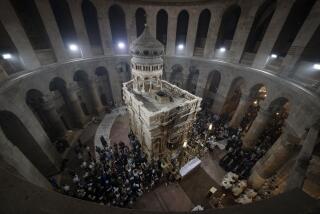Muslim Power Play Needs Firm Response in Nazareth
- Share via
The campaign by Muslim fundamentalists to build a mosque near the Church of the Annunciation in Nazareth is not about religious freedom and certainly not about God and prayer. It is about political power and violent intimidation.
The force behind the campaign is the Islamic Movement, a fundamentalist Muslim organization, which sees the mosque as a symbol of its goal of ruling Nazareth, Israel’s largest Arab city. The organization currently controls the Nazareth City Council but not yet city hall (Ramez Jeraisi, the mayor, is Christian).
The proximity of the proposed mosque to the church, Nazareth’s main Christian shrine, is a deliberate challenge to the city’s Christian identity. In the past, Muslim conquerors of the Holy Land built mosques whose minarets still tower over Christian sites like Jerusalem’s Church of the Holy Sepulcher. Now Muslim fundamentalists want to impose the architecture of religious triumphalism on Nazareth, sacred to Christians as the place of Jesus’ youth.
The Israeli government’s “compromise solution”--which allows the building of a mosque, though smaller than the one envisioned by Islamic militants and separated from the Church of the Annunciation by a wall--is a surrender to political extortion. The mosque campaign has been accompanied by violent assaults on Christians, including Muslim attacks during the past year against Christian stores in Nazareth on two sacred Christian holidays, Christmas and Easter. The Israeli government knows that Nazareth’s Christians, who have been reduced to a terrified minority, won’t riot. In Nazareth, the threat of violence comes from only one direction.
The Israeli government’s capitulation to the Islamic Movement comes at a time when Israelis are debating how to handle the growing threat of fundamentalism among the country’s 1 million Arab citizens. In recent weeks, three terrorist attacks against Jews have been initiated by Arab Israeli members of the Islamic Movement. Though organization leaders have repudiated those attacks, the violence has awakened Jewish fears of a fundamentalist-inspired Arab Israeli insurrection. The Shin Bet security agency has recommended a government crackdown on the Islamic Movement, including monitoring speeches delivered by movement-affiliated preachers in Israeli mosques. So far, though, the government has decided to continue treating the Islamic Movement as a legitimate organization, complete with parliamentary representation, fearing that a crackdown will only drive militants underground and increase sympathy for the group.
That wise policy of restraint, though, has turned into appeasement in Nazareth. The Israeli government should be sending a clear message to the Islamic Movement that it won’t tolerate violent intimidation against the Christian minority. The fundamentalist squatters who have built a tent on the property of the proposed mosque should be immediately removed by police. As a conciliatory gesture, the government should then begin talks with Islamic leaders about building additional mosques in Nazareth, which is 70% Muslim. But under no circumstance should a mosque be built near the Church of the Annunciation, where tradition says Mary was told by the Angel Gabriel that she would give birth to Jesus.
A Nazareth court recently provided the government with a legal rationale for blocking the mosque’s construction. The court ruled that the disputed land on which the mosque is to be built is mostly owned by the state, and not by the Wakf, the Muslims religious trust, as fundamentalists claimed. Only a small area, containing the grave of Sha’hab el-Din, nephew of Saladin, the Muslim warrior who won the Crusades, is owned by the Wakf.
One wonders whether the fact that the grave is linked to Saladin is an additional inspiration for Muslim fundamentalists, who see themselves as fighting against the “modern Crusaders” of the West. Is that the religious message that Israel--itself perceived by fundamentalists as a latter-day “Crusader state”--should be indulging?
An Israeli cabinet minister, a member of the government committee that devised the Nazareth compromise, told me privately that, while he sympathizes with the Christians, “We can’t forget that we live in the Muslim world.”
That dilemma is real. But as custodian of the Holy Land, Israel is obligated to place fairness above politics. In fact, a compelling precedent exists for insisting on Muslim respect for Christian sensitivities. Though the Temple Mount is Judaism’s holiest site, successive Israeli governments have resisted demands by religious Jews to pray there precisely because that would offend Muslims and threaten Jerusalem’s delicate religious truce.
Israel has the right to demand similar restraint from its Muslim citizens for the sake of peace in Nazareth.
*
Yossi Klein Halevi is a senior writer for the Jerusalem Report.
More to Read
Sign up for Essential California
The most important California stories and recommendations in your inbox every morning.
You may occasionally receive promotional content from the Los Angeles Times.










